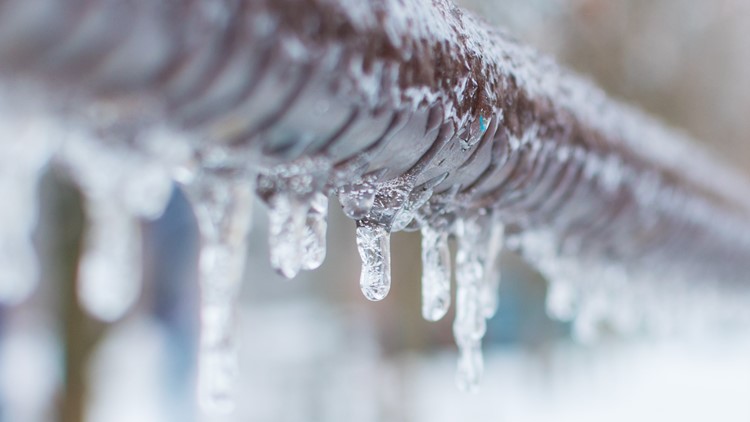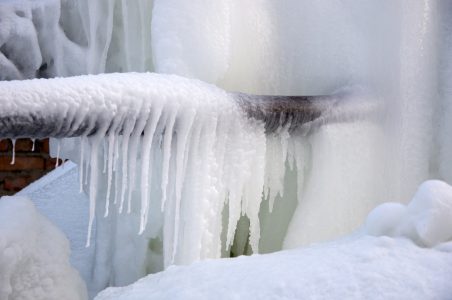Avoiding Frozen Pipes in Cold Weather: Essential Advice
Avoiding Frozen Pipes in Cold Weather: Essential Advice
Blog Article
We have found this article involving 6 Ways to Prevent Frozen Pipes listed below on the internet and believe it made good sense to write about it with you in this article.

Cold weather can damage your plumbing, specifically by freezing pipes. Right here's how to avoid it from happening and what to do if it does.
Introduction
As temperature levels decrease, the threat of frozen pipelines increases, possibly leading to costly repairs and water damage. Understanding how to avoid frozen pipelines is important for house owners in chilly climates.
Comprehending Frozen Pipelines
What causes pipes to ice up?
Pipes ice up when exposed to temperatures listed below 32 ° F (0 ° C) for prolonged durations. As water inside the pipelines ices up, it increases, taxing the pipeline walls and potentially creating them to break.
Dangers and damages
Icy pipelines can bring about water supply interruptions, home damages, and expensive repairs. Burst pipelines can flooding homes and create substantial architectural damage.
Signs of Frozen Piping
Determining frozen pipelines early can prevent them from breaking.
Just how to identify icy pipes
Look for reduced water flow from taps, uncommon odors or sounds from pipelines, and noticeable frost on exposed pipes.
Avoidance Tips
Insulating prone pipes
Cover pipelines in insulation sleeves or utilize warmth tape to safeguard them from freezing temperatures. Focus on pipelines in unheated or outside areas of the home.
Heating techniques
Maintain indoor areas adequately heated, specifically locations with plumbing. Open closet doors to enable cozy air to flow around pipelines under sinks.
Securing Exterior Pipes
Garden hoses and exterior taps
Disconnect and drain pipes garden hoses prior to wintertime. Install frost-proof faucets or cover outdoor faucets with protected caps.
What to Do If Your Pipelines Freeze
Immediate actions to take
If you think icy pipes, maintain faucets open up to relieve stress as the ice melts. Make use of a hairdryer or towels soaked in hot water to thaw pipes slowly.
Long-Term Solutions
Structural changes
Consider rerouting pipes away from exterior walls or unheated locations. Add additional insulation to attic rooms, cellars, and crawl spaces.
Updating insulation
Invest in high-quality insulation for pipelines, attics, and walls. Proper insulation aids keep constant temperatures and reduces the risk of icy pipes.
Verdict
Avoiding frozen pipes requires aggressive procedures and fast responses. By comprehending the causes, signs, and safety nets, property owners can safeguard their plumbing throughout winter.
Helpful Tips to Prevent Frozen Pipes this Winter
UNDERSTANDING THE BASICS: WHY PIPES FREEZE AND WHY IT’S A PROBLEM
Water freezing inside pipes is common during the winter months, but understanding why pipes freeze, and the potential problems it can cause is crucial in preventing such incidents. This section will delve into the basics of why pipes freeze and the associated problems that may arise.
THE SCIENCE BEHIND FROZEN PIPES
When water reaches freezing temperatures, it undergoes a physical transformation and solidifies into ice. This expansion of water as it freezes is the primary reason pipes can burst. As the water inside the pipe freezes, it expands, creating immense pressure on the walls. If the pressure becomes too great, the pipe can crack or rupture, leading to leaks and water damage.
FACTORS THAT CONTRIBUTE TO PIPE FREEZING
Low Temperatures: Extremely cold weather, especially below freezing, increases the risk of pipes freezing. Uninsulated or Poorly Insulated Pipes: Pipes located in unheated areas, such as basements, crawl spaces, or attics, are more prone to freezing. Insufficient insulation or lack of insulation altogether exacerbates the problem. Exterior Wall Exposure: Pipes running along exterior walls are susceptible to freezing as they encounter colder temperatures outside. Lack of Heating or Temperature Regulation: Inadequate heating or inconsistent temperature control in your home can contribute to frozen pipes. PROBLEMS CAUSED BY FROZEN PIPES
- Pipe Bursting: As mentioned earlier, the expansion of water as it freezes can cause pipes to burst, resulting in significant water damage.
- Water Damage: When pipes burst, it can lead to flooding and water damage to your property, including walls, ceilings, flooring, and personal belongings.
- Structural Damage: Prolonged exposure to water from burst pipes can compromise the structural integrity of your home, leading to costly repairs.
- Mold and Mildew Growth: Excess moisture from water damage can create a favorable environment for mold and mildew growth, posing health risks to occupants.
- Disrupted Water Supply: Frozen pipes can also result in a complete or partial loss of water supply until the issue is resolved.
WHY CERTAIN PIPES ARE MORE PRONE TO FREEZING
- Location: Pipes located in unheated or poorly insulated areas, such as basements, crawl spaces, attics, or exterior walls, are at higher risk of freezing.
- Exterior Pipes: Outdoor pipes, such as those used for irrigation or exposed plumbing, are particularly vulnerable to freezing as they are directly exposed to the elements.
- Supply Lines: Pipes that carry water from the main water supply into your home, including the main water line, are critical to protect as freezing in these lines can affect your entire plumbing system.
- Underground Pipes: Pipes buried underground, such as those connected to sprinkler systems or outdoor faucets, can be susceptible to freezing if not properly insulated.
https://busybusy.com/blog/helpful-tips-to-prevent-frozen-pipes-this-winter/

We were made aware of that report on Prevent Frozen Pipes through an associate on a different blog. Sharing is caring. Helping others is fun. Thank you for going through it.
Schedule Service Pickup Report this page